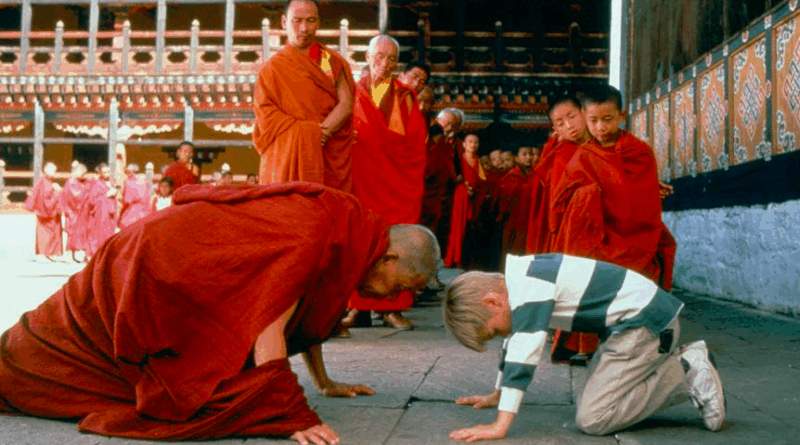REVIEW: ‘Little Buddha’ returns to theaters in new 4K restoration
Photo: Little Buddha combines two stories — one ancient and one set in the modern day — into a single narrative. Photo courtesy of Kino Lorber / Provided with permission.
Bernardo Bertolucci’s Little Buddha, an epic retelling of the Buddha’s story interwoven with a contemporary tale of reincarnation, has a lot of qualities that are quite admirable, even more than 30 years after its initial release. For starters, the visuals are stunning, especially in the parts of the movie featuring Keanu Reeves as Siddhartha, the person who would later become the Buddha. The palaces, the monks’ garb, the cascading tiled roofs and the regality of it all are expertly captured by Vittorio Storaro, known for his work on Apocalypse Now. And these visuals look wondrous in the film’s new 4K restoration.
Where the film falters is in the combining of the old and the new. Scenes of Reeves becoming the Buddha are interspersed with a modern-day narrative that finds a group of Tibetan monks seeking out a young American child who may be the reincarnation of a spiritual teacher by the name of Lama Dorje, according to press notes. Chris Isaak and Bridget Fonda play the boy’s parents, and the storytelling surrounding them and their son is a bit wobbly. It’s never entirely believable how their story joins with the narrative of the monks, and some of the dialogue, written by Robert Wurlitzer and Mark Peploe, has not aged well.
There’s also the fact that other films, of higher quality, tell similar stories. One can find equally stunning visuals, but a much more poignant central tale, in Martin Scorsese’s Kundun, which also deals with reincarnation and the quest to see if a child has been reincarnated.
Much credit should be given to Ying Ruocheng for his supporting work in the film, which is expert and anchors his several scenes. The acting from Fonda and Isaak is perfectly fine, even though their characters are underwritten. The child actors seem to have a fun time with their respective roles, and the children who watch Little Buddha will likely be delighted by their antics. Reeves unfortunately feels miscast and can’t quite capture the energy that’s needed for such a central role.
When the young American heads to Bhutan with his father in order to check out these reincarnation allegations, the story moves along at a steady pace, and there’s a real desire on the part of the audience to figure out what might happen in the end. But one comes to realize that Bertolucci and his team are not that interested in the finale, but rather in the journey itself. Yes, it’s important for these characters to find the reincarnated Lama Dorje, but along the way the monks also exude their patience, love, peacefulness, humor and heritage. By the movie’s end, those redeeming qualities are what win over the audience — plus those stunning visuals in Bhutan, and how Storaro is able to capture so much color and texture in a single shot.
The new 4K restoration, now playing in theaters thanks to Kino Lorber, offers such a unique and breathtaking portraiture of Tibetan Buddhists that it’s deserving of a revisit in a movie theater. The stylistic choices of the creative team wash over the audience with obvious beauty and technical skill. The fact that the story and performances are not as expertly drawn is probably an inevitability that could not be averted.
By John Soltes / Publisher / John@HollywoodSoapbox.com
Little Buddha (1993). Directed by Bernardo Bertolucci. Written by Robert Wurlitzer and Mark Peploe. Starring Keanu Reeves, Ying Ruocheng, Bridget Fonda and Chris Isaak. Rated PG for some disturbing images. Rating: 




